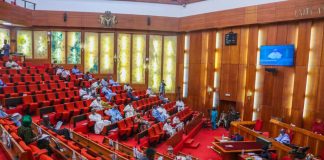🌿 Ruzu Non-Alcoholic Herbal Bitters
Ruzu Non-Alcoholic Herbal Bitters is a natural health supplement specially formulated to:
- ✅ Promote general wellness
- ✅ Detoxify the body
- ✅ Support the treatment of various ailments
Made from a powerful blend of 100% organic and medicinal herbs, Ruzu is completely alcohol-free, making it ideal for:
- 👪 All age groups
- 🌱 Health-conscious individuals
- 🌿 Anyone seeking non-alcoholic herbal remedies
Whether you're looking to boost your vitality, cleanse your system, or support healing the natural way, Ruzu Bitters offers a trusted herbal solution.
Barr LUC Nwakaeti, the former Chairman of the Nigeria Bar Association (NBA) in Owerri, Imo State, believes that the judiciary has lost its independence as a result of political influence and poor finance.
He stated that the judiciary is the cornerstone of democracy, the gatekeeper of democratic principles, and the custodian of the constitution, and that its independence is critical to ensuring that justice is served without fear or favor.
However, Nwakaeti stated that the concept of judicial independence, which is seen as the last hope of the common man, is in reverse in Nigeria.
The former NBA Chairman stated this as a guest speaker at the opening of the NUJ Work Station on the theme of “the roles of judicial institutions in a democracy” in Owerri, the Imo state capital, saying that the concept of judicial independence in Nigeria only exists in theory and that judicial pronouncements, particularly in political cases, are influenced by the whims and caprices of the executive branch of government.
According to him, “Very recently in Nigeria, it is sad to posit that the concept of judicial independence, as the last hope of the common man, is in reverse gear and largely observed in the breach.” Recent court rulings on established legal matters, known as judicial precedent, have been widely exploited by all categories of courts. The judiciary’s position appears to be ambiguous and comparable to a nonexistent idea. The system is considered to be independent in theory, yet it is easily controlled by the other branches of government. The age-old principle of “separation of powers” that assigns the governmental functions of law-making, enforcement/execution, and interpretation to the legislative, executive, and judiciary as state organs cannot be considered to be effective.”
Continuing, “Democracy in Nigeria is badly undermined, and the rule of law, as well as individual rights and liberties, are generally suspended or are subject to the whims and caprices of a dominant minority.
Rather than operating independently of the other branches of government, the exercise of the judiciary’s powers and functions has now been subject to political interference or influence, and as a result, it has failed to meet the ordinary man’s expectation of being his last chance.
“The aforesaid scenario is the result of a number of problems compromising its efficacy, including judicial corruption, insufficient funding and resources, political interference, case backlogs/delays, and, finally, the appointment process. This latter feature, in my opinion, has transformed appointments to judicial seats into inherited rights, spousal gifts, and influence peddling. It is no longer based on merit, as it formerly was.
Read Also: Union Bank Strengthens Sustainable Leadership with Symposium and School Recycle Bin Donations on World Environment Day 2025
Nwakaeti stated that a functional judiciary should be able to curb the misuse of power by the government and its agents, as well as manage conflicts that are unavoidable as a result of unwholesome rivalry for political power.
“There is little question that a functional judiciary will not only limit abuses of power by the government and its agents, but it will also be capable of resolving conflicts that are certain to arise as a result of unwholesome rivalry for political power. All efforts must be aimed toward establishing a court capable of fulfilling its historic responsibilities of protecting civil liberties, the rule of law, and democratic principles.”
He went on to say, “To be more efficient, Nigeria’s judiciary must not only be well and adequately funded, but appointments to the judicial system must be strictly based on merit rather than the whims and caprices of the executive.” (Taking into account the recent NJC verdict in Imo state); Judicial officers should be intellectually and morally sound and knowledgeable in the dispensation of justice; Only competent, upright, highly disciplined, and courageous individuals, ready and bold to dispense justice without fear or favor regardless of who is involved, should be appointed as judicial officers.”
















